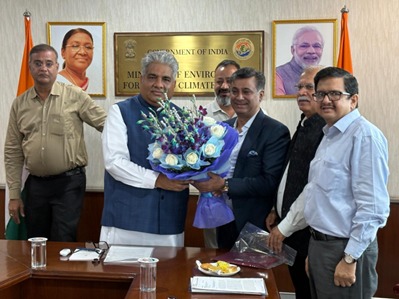Delegation of Wooden Handicraft Exporters meet Union Minister of Environment Bhupender Yadav
Delhi/NCR, 02nd September 2025 – A delegation of handicrafts exporters led by Shri Sagar Mehta, Vice Chairman, EPCH met Shri Bhupender Yadav, Union Minister of Environment, Forest and Climate Change, Govt. of India in the presence of Shri Tanmay Kumar, Secretary, MoEFCC; Shri Sushil Kumar Awasthi, Director General – Forest; Shri Hansraj Baheti, Member CoA EPCH from Jodhpur; Shri Naresh Bothra, President, Jodhpur Handicrafts Exporters Federation; Shri Mohd. Ausaf, General Secretary, Saharanpur Wood Carving Manufacturer Association; Shri R. K. Verma, Executive Director – EPCH, Shri Rajesh Rawat, Addl. Executive Director-EPCH; Shri Sachin Raj, Convener, NCCF; Shri Anwar Ahmed prominent member exporter from Saharanpur, Shri Raunak Parakh prominent member exporter from Jodhpur were present.
The objective of the meeting was to apprise the Minister about the issues and challenges faced by wooden handicraft exporters with respect to EUDR compliance, Minister heard the issue raised patiently and assured the concerns would be duly examined informed Shri Rajesh Rawat, Addl. Executive Director -EPCH.
Dr. Neeraj Khanna, Chairman-EPCH, said “While we appreciate the EU’s commitment to combating deforestation, but the EUDR compliance requirements could severely impact our wooden handicrafts exporters. Our wooden handicrafts are primarily made from Mango, Acacia and Sheesham wood which are sourced largely from agroforestry. These species are grown outside forests and do not contribute to deforestation. He further added “we believe that such stringent compliance requirements, if implemented without contextual adjustments, could lead to significant disruptions. Many artisans and MSME exporters may lose access to EU markets, resulting in reduced production, cancelled orders and widespread unemployment among artisans and their dependents.”
Sagar Mehta, Vice Chairman – EPCH shared that “The handicrafts sector is the economic backbone for millions of artisans in rural and semi-urban India. Despite the sustainable nature of sourcing, EUDR places uniform obligations on all timber exporters, disregarding contextual differences in countries like India. Without government intervention, compliance with EUDR could become prohibitively complex for our exporters.
Mehta further urged government for a coordinated national response and constructive engagement seeking an inter-ministerial committee between MoEFCC, MoAFW, MoC&I, Ministry of Textiles/Development Commissioner (Handicrafts) and DGFT to deliver a digital traceability/geo-location framework with a centralised documentation system; direct state forest departments to capture plot geo-coordinates and felling volumes and make working plans accessible; launching a National Timber Portal System linked to the VRIKSH scheme; publish a licensed sawmill registry with geo-coordinates and deferment or suitable exemptions for wooden handicrafts made from agroforestry based wood such as Mango, Acacia and Sheesham.
Shri Hansraj Baheti, Member CoA – EPCH from Jodhpur said that “The European Union’s deforestation regulations present a critical challenge for wooden handicraft exporters, particularly MSMEs and artisan-based enterprises. While we fully support sustainable and responsible trade, it is essential to recognize the unique nature of our wooden handicrafts sector, which relies on agroforestry and does not contribute to deforestation. We request a collaborative approach involving government bodies, industry stakeholders to develop a pragmatic compliance framework that protects our artisans while meeting global sustainability goal”.
R. K. Verma, Executive Director-EPCH said “EPCH has always been committed towards aligning with global sustainability frameworks through initiatives like “Vriksh” Timber Legality Assessment and Verification Scheme, an internationally recognized system that assures the legality and sustainability of wood sourcing. However, large-scale implementation of geo-referenced traceability systems requires policy support, funding and international engagement. This collective approach will ensure compliance while safeguarding India’s export competitiveness.”



Comments are closed.